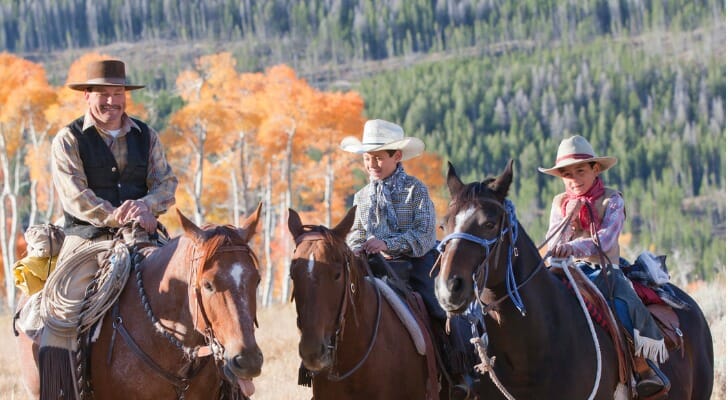Wyoming Inheritance Laws: What You Should Know
Wyoming does not have a state inheritance tax or estate tax. However, the state has laws concerning intestate succession, probate, taxes, what makes a will valid and more. If you want professional guidance for your estate...Friday, March 20th 2020, 5:05 am
By Sarah Fisher
 Wyoming does not have a state inheritance tax or estate tax. However, the state has laws concerning intestate succession, probate, taxes, what makes a will valid and more. If you want professional guidance for your estate planning, or if you need advice on managing an inheritance, you can use the SmartAsset financial advisor matching tool to find an advisor near you.
Wyoming does not have a state inheritance tax or estate tax. However, the state has laws concerning intestate succession, probate, taxes, what makes a will valid and more. If you want professional guidance for your estate planning, or if you need advice on managing an inheritance, you can use the SmartAsset financial advisor matching tool to find an advisor near you.
Does Wyoming have an Inheritance Tax or an Estate Tax?
Wyoming does not levy an inheritance tax or an estate tax. However, if you are inheriting property from another state, that state may have an estate or inheritance tax that applies. You will also likely have to file some taxes on behalf of the deceased. And of course, the federal estate tax applies if your estate is large enough.
Other Necessary Tax FilingsWhen you die, there are many federal and estate tax situations that need to become a priority for those who survive you. Besides the state estate tax, you need to look out for the following:
- Final individual federal and state income tax returns – The federal and state tax returns are due by Tax Day of the year following the individual’s death.
- Federal estate/trust income tax return – Due by April 15 of the year following the individual’s death
- Federal estate tax return – Due nine months after the individual’s death, though an automatic six-month extension is available if asked for prior to the conclusion of the nine-month period
- This is required only of individual estates that exceed a gross asset and prior taxable gift value of $11.58 million in 2020
To file any of these estate-based returns, you’ll need to apply for an employer identification number (EIN) with the IRS. You can do this online, by fax or via mail.
Dying with a Will in WyomingFor a will to be valid in Wyoming, you must sign or acknowledge your will in front of two witnesses, and those witnesses must sign your will. Your witnesses should not stand to inherit from you.
Although you do not need a notary to make your will legal, a notary can allow you to make your will “self-proving.” A self-proving will speeds up the probate process because the court can accept the will without needing to contact the witnesses who signed the will. To make the will self-proving, you and your witnesses must each go to the notary and sign an affidavit proving who you are and that you know you were signing the will.
If you and your spouse divorce, or if a court determines that your marriage is not legal, Wyoming law revokes any language in your will that leaves property to your spouse or names them as the executor. However, this rule does not apply if you state in your will that divorce should not affect will provisions, or if you happen to divorce and then remarry your spouse.
Once the will is determined to be valid, the next step is the probate process. Generally, probate proceedings are only necessary if the deceased person owned any assets in their name only. Other assets, also known as “non-probate” property, can usually be transferred to the other owner without probate.
Wyoming, which is not a Uniform Probate Code state, offers a simplified probate process for smaller estates, as well as an affidavit process that allows heirs to completely skip probate. In order to qualify for the affidavit process, the value of the entire estate, after liens and encumbrances are subtracted, cannot be more than $200,000. All an heir has to do is prepare a short affidavit, signed under oath, stating that they are entitled to a certain asset. When the person or institution holding the property receives the affidavit and a copy of the death certificate, they release the asset. The affidavit must be filed with a county clerk, and there is a 30-day waiting period.
Wyoming also offers a simplified probate process for small estates. If the affidavit procedure was used, there is no need to use the simplified probate process. An estate qualifies for this process if the value of the entire estate, less liens and encumbrances, is $200,000 or less. To use this procedure, the executor files a written request with the local probate court requesting to use it. The court can then allow the executor to distribute the assets without needing to go through regular probate.
The request must include the relationship between the heir and the decedent, the legal reason why the heir is claiming a right to the property, a statement addressing whether any other heir has a right to the property, and a full description of any real property or mineral interests the decedent owned. The heir must then obtain a sworn report with a broker’s price opinion about the value of any real property the decedent owned, publish a notice of the request once a week for two weeks in a newspaper published in the county where the request was filed, and mail a copy of the request to. the surviving spouse, other inheritors, and any known creditors within ten days of the first publication date. The newspaper publisher must sign an affidavit that the notice was published, and the inheritor must give this affidavit to the court. If the decedent received state medical assistance, the heir must also give a copy of the request to the state department of health. There is a 30-day waiting period with this procedure.
Dying Without a Will in WyomingIf you die without a valid will, you’ll lose control over what happens to your assets after your death. Wyoming inheritance laws label these types of estates “intestate,” which means there is no will, or no valid will. The court will then follow intestate succession laws to determine who inherits your assets, and how much they get. If there isn’t a will, the heirs by law must agree and appoint someone to serve as the executor of the probate estate. The person appointed must consent to the role.
Although there are usually extenuating factors when someone dies intestate, it’s best not to put your loved ones through that kind of stress.
Spouses in Wyoming Inheritance LawIf you die intestate in Wyoming, which is not a community property state, what your surviving spouse inherits depends on whether or not you have living descendants. Living descendants would include children, grandchildren, and great-grandchildren. If you don’t, your spouse will inherit all your intestate property.
Children in Wyoming Inheritance LawIf you have a surviving spouse and descendants, your spouse inherits half of your intestate property and your descendants inherit the other half. If you have children but no spouse, your children will inherit all your intestate property.
Intestate Succession: Spouses and Children Inheritance Situation Who Inherits Your Property Children but no spouse – Children inherit everything Spouse but no descendants – Spouse inherits everything Spouse and descendants – Spouse inherits half– Descendants inherit half
Legally adopted children have just as much right to their intestate share as biological children do. In addition, if the decedent placed their child up for adoption and that child was adopted by another family, that child is still entitled to an intestate share of the decedent’s estate. However, foster children and stepchildren who were never legally adopted by the decedent are not eligible to receive a share as the decedent’s child.
Children born outside of marriage still receive their share as long as paternity was. established under Wyoming law. The decedent’s children can still receive their share if they are born after the decedent’s death. Grandchildren will receive a share only if their parent is not alive to inherit.
Unmarried Individuals Without Children in Wyoming Inheritance LawIntestate succession in Wyoming if there is no surviving child or spouse is arranged as in the chart below:
Intestate Succession: Extended Family Inheritance Situation Who Inherits Your Property Parents but no siblings Parents inherit everything Siblings but no parents Siblings inherit everything Siblings and parents Parents and siblings inherit in equal sharesAlthough there is an intestate process designed to make sure your family inherits, it is generally best to write your own will. That way, you can ensure that all of your property ends up where you want it to after your death. If no eligible relatives can be found, your property will become the property of the state of Wyoming.
Non-Probate Wyoming InheritancesThe probate process can be costly and difficult. However, you have some options when trying to avoid probate in Wyoming. These assets will also not be affected by intestate succession laws. Instead, they go directly to the named beneficiary upon your death. Listed below are some of the non-probate assets available in Wyoming.
- Any property in a living trust
- Life insurance policies
- 401(k)s, IRAs, other retirement accounts
- Securities in transfer-on-death accounts
- Pay-on-death bank accounts
- Joint tenancy real property
- Tenancy by the entirety
 Immigration status is irrelevant when it comes to inheritance. If a relative of yours is entitled to a share of your assets, they can inherit no matter what their citizenship status is. There is one exception, which is that a resident alien cannot inherit real estate if the laws of that person’s home country does not allow U.S. citizens to inherit real estate.
Immigration status is irrelevant when it comes to inheritance. If a relative of yours is entitled to a share of your assets, they can inherit no matter what their citizenship status is. There is one exception, which is that a resident alien cannot inherit real estate if the laws of that person’s home country does not allow U.S. citizens to inherit real estate.
Half-relatives inherit as much as “whole” relatives. For example, your half-sibling would get the same share as any other sibling. Relatives conceived before you die but born after the decedent’s death are eligible to inherit as if they had been born while the decedent was alive.
There are some protections written into Wyoming inheritance law. If you give an heir property during your lifetime, the value of that gift can be subtracted from your relative’s share, but only if it is in writing at the time the gift was made, or if the heir admits it in writing. In addition, if someone feloniously kills you, they will not receive a share of your property.
Resources for Estate PlanningManaging your own estate, or handling the intricacies of inheriting money, can get complicated. That’s why many people choose to work with a professional.
The SmartAsset financial advisor matching tool can match you with nearby financial advisors equipped to handle your estate and inheritance planning needs. If you’re ready to work with a financial advisor in your area, get started now.
Photo credit: ©iStock.com/Brian Evans, ©iStock.com/Drazen Zigic, ©iStock.com/dmathies, ©iStock.com/christiannafzger
The post Wyoming Inheritance Laws: What You Should Know appeared first on SmartAsset Blog.
Information contained on this page is provided by an independent third-party content provider. Frankly and this Site make no warranties or representations in connection therewith. If you are affiliated with this page and would like it removed please contact pressreleases@franklymedia.com
More Like This
March 20th, 2020
December 14th, 2024
December 14th, 2024
Top Headlines
December 14th, 2024
December 14th, 2024
December 14th, 2024
December 14th, 2024










